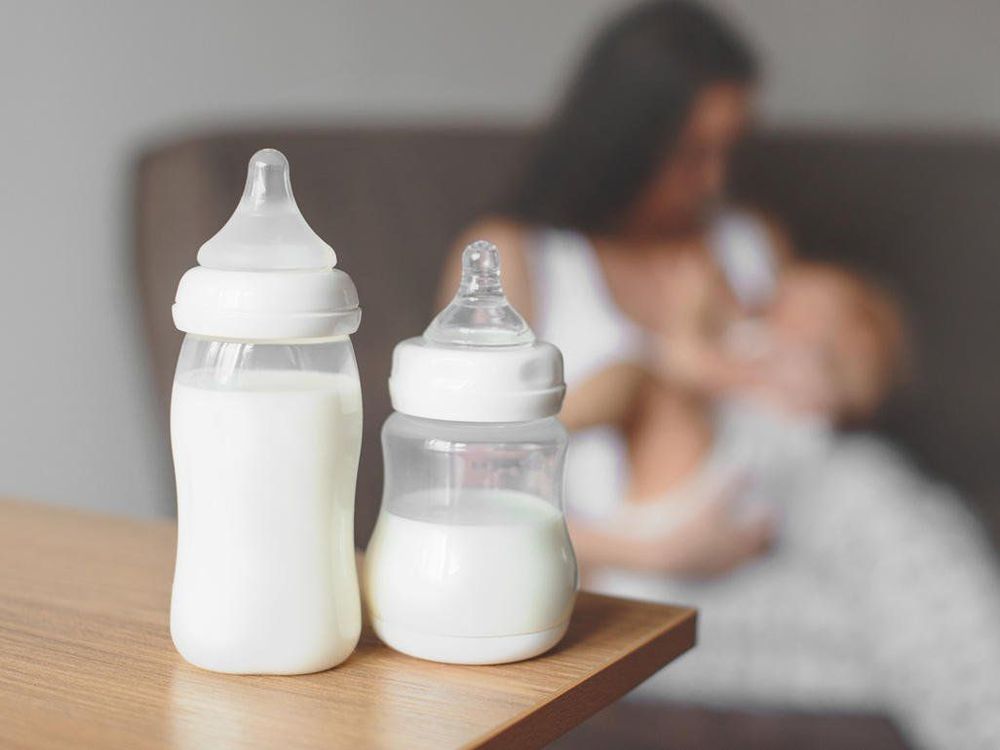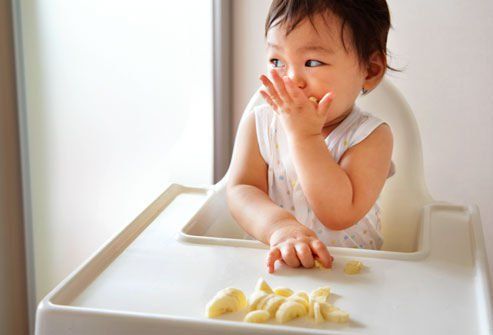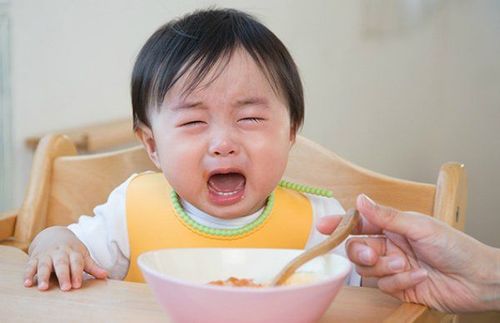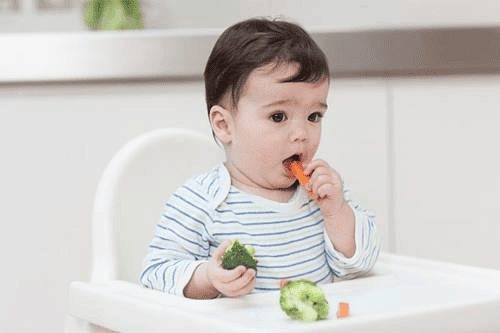This is an automatically translated article.
The article is professionally consulted by Master, Doctor Huynh Bao Toan - Department of Pediatrics - Neonatology - Vinmec Nha Trang International General Hospital.Helping your baby get used to solid foods is a very important step in teaching your baby to eat, helping your baby's teeth and jaws develop. So when should you start giving your baby solid foods?
1. Signs your baby can switch to solid foods
Most pediatricians of the American Academy of Pediatrics recommend giving babies solid foods by the time they are 6 months old. In addition to breastfeeding, the following signs show that your baby is ready for solid foods:Baby has a stiff neck, can sit up straight (this is very important) Baby can sit well or sit firmly and needs a lot of work. little help The baby shows interest in the food you give him. Some babies can hold food on their own and put it in their mouths fairly accurately. Children should only eat solid foods when their health is not abnormal and they are in a happy and comfortable mood. If your baby is sick, delay the start of solid foods until the baby is really healthy.
2. Feed dosage at the start
80 - 90% of the main food for babies is still breast milk or formula. Snacks should only account for 10-20%. This is the time when children learn to get used to food. Therefore, children still need to eat the same amount of milk as before and only start weaning with a small amount (1 spoonful for the first meal and then gradually increase over the next few days). meals/day for the first month of weaning, then 1 month you can increase to 2 meals depending on your baby's needs.Some food suggestions for babies starting solids
Cooked and cooled vegetables, like carrots, potatoes, sweet potatoes, pumpkin Cooked and cooled fruits like peaches, apples , pear... Baby rice or cereal, mixed with milk daily Some other vegetables like broccoli, cauliflower, spinach, fruit like kiwi, orange, strawberry and mango. Once your child is interested in vegetables and fruits you can switch to foods from the following groups:
Bread, pasta Full-fat dairy foods like cheese Meat, fish, eggs, bean.

80 - 90% thức ăn chính cho con vẫn là sữa mẹ hoặc sữa công thức. Đồ ăn dặm chỉ nên chiếm 10 - 20%
3. Some notes when feeding baby solids
3.1 When children are ready for the transition from pureed to solid foods To ensure a healthy and reasonable weaning process, you need to prepare foods according to the principle of thin to dense, from less to more. . The first step is to puree the food. Let your baby try sweet foods first.Initially, you can feed your baby powder or porridge made from rice, add mashed vegetables, eggs, fish meat, ... grease, mashed fruit. But note that children need to provide enough 4 groups of substances in their daily meals, including: Carbohydrates, fats, proteins, vitamins and minerals. In your daily main meal, you need to combine all these ingredients.
The principle of introducing new foods to children, you should give your child a new food for 3 consecutive days so that the child gets used to the taste and at the same time monitor to see if the child has any food allergies.
3.2 When the child is able to sit in a high chair When the child is able to sit upright, has control over his head and neck. Children can eat with a high chair or high chair. Practicing the habit of sitting on a chair when feeding and taking it out at the end of the meal will create a good reaction for the baby later. But you'll need to follow these safety rules: Always fasten your baby's seat belt. As children get older, they will become more active and won't sit still, accidents can happen when you don't keep an eye on them.
3.3 When Babies Can Control Food With Fingers Babies 7 to 11 months old will act out to show you that they want to be eaten by trying to take food from your hand. However, you need to note that solid foods for children to eat must be soft enough and cut them to fit the child's reach so that the child can easily grasp the food with his thumb and index finger.
Some suggestions on food for children at this time, small cooked vegetables such as carrots, zucchini, pumpkin, radish... tender chicken, small round cereals without sugar... Do not give Children eat grapes, hot dogs, nuts and hard candies, because these foods pose a choking hazard.

Cần lưu ý thức ăn đặc cho trẻ ăn phải đủ mềm và cắt chúng vừa tầm tay trẻ
Let children get used to putting spoons in their mouths with thicker, thicker foods such as yogurt, cheese, mashed potatoes.... Remember to use plastic bibs for babies to learn weaning and ready for eating. Food is scattered everywhere.
3.5 When babies can drink water Babies don't need water for the first 6 months of life. They get all the water they need in a day from breast milk or formula. Infants under 6 months of age should not be given any kind of water at all, because it is easy to fill the stomach, causing the child to confuse water and milk, leading to anorexia or malabsorption. Around 8 months old, babies can start drinking water with meals using a small cup.
If your child enjoys drinking water, you can give him a few small sips. However, don't let your baby use water as a substitute for breast milk or the nutritious formula your baby should be receiving.
3.6 Do not force eat Absolutely do not force children to eat if they do not like it. Some telltale signs that your baby is having anorexia are: Your baby may swing a spoon, turn his head away, purse his lips tightly, spit out anything you put in his mouth, or cry.

Hãy nhớ rằng tuyệt đối không nên ép trẻ ăn nếu trẻ không thích
Honey can contain bacteria that make babies under 12 months old Severe illness Whole nuts because of the risk of choking, or allergies in families with a history of allergies to peanut products. Shark and swordfish are high-mercury fish that are not safe for children. Foods high in salt or sugar: Too much salt (more than 1g per day) will be harmful to your child's kidneys. Sugar is harmful to children's teeth, avoid giving children sweets such as cakes, cookies, sugary drinks. Raw milk Children's foods need to be clean and should be thoroughly cooked. Weaning is an extremely important period for children to develop comprehensively. Children who do not eat properly are at risk of micro-mineral deficiencies, causing anorexia, growth retardation, malabsorption, etc. If they notice the above signs, parents should supplement their children with supportive products. The supplement contains lysine, essential micro-minerals and vitamins such as zinc, chromium, selenium, and B vitamins to help fully meet the nutritional needs of children. At the same time, these essential vitamins also support digestion, enhance nutrient absorption, help improve anorexia, and help children eat well.
Parents can learn more:
Signs of zinc deficiency in children
Micronutrient deficiency and failure to gain weight in children
Please regularly visit Vinmec.com website and update useful information to take care of your child. Take care of the baby and the whole family.
Reference source: webmd.com














